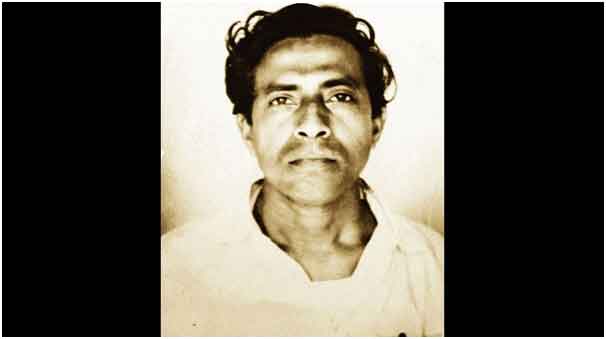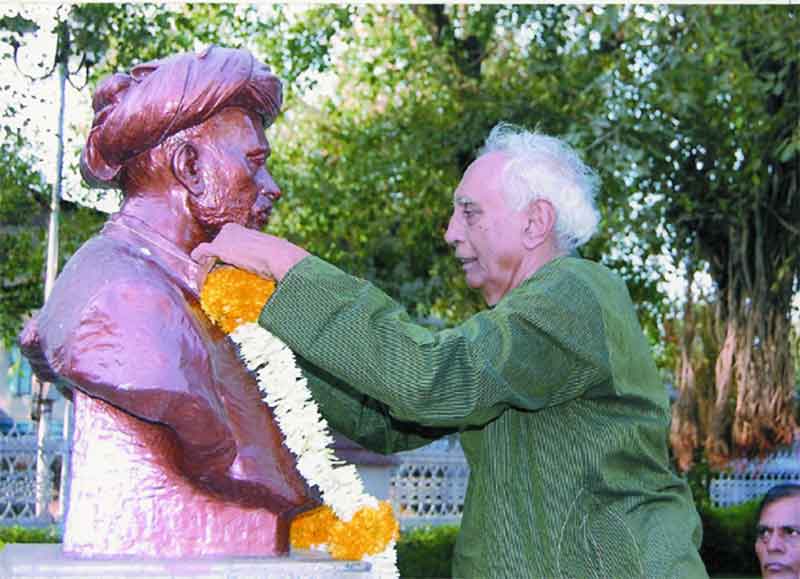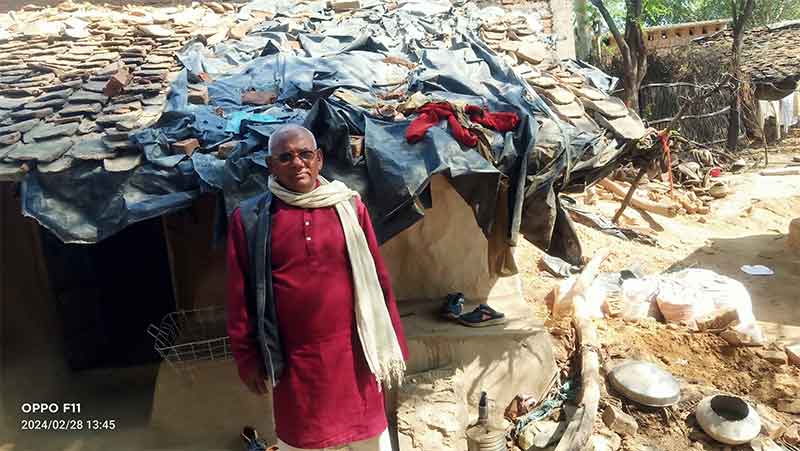
Around a month on August 5th, ago we commemorated the 50th anniversary of the assassination of Saroj Dutta,which was landmark or black day in the history of the Indian Communist movement. Whatever his gross errors as a Marxist revolutionary, his spirit will shimmer for ever like a lotus in full bloom, in the annals of the Indian Communist Movement. Without doubt he was amongst the great crusaders for India’s liberation. To me his traits bore strong similarity with the legendary Che Guevera.
Saroj Dutta’s journey in the revolutionary movement was like an essay scripted. Few poets ever transcended such depths of creativity or originality in the revolutionary stream or ignited the spark of revolution with such intensity.Saroj Dutta’s face was a reflection of the anguish or turmoil faced in West Bengal in the late 1960’s and 1970’s.His murder in jail custody symbolised the neo-fascist nature of the ruling party which morally suppressed any dissent with Naxalbari simply trembling the ruling classes at an unprecedented level. The life of Saroj Duta,was like revolutionary poetry in motion. Few poems touched the core of the soul of the Bengali masses like Saroj.,who created the effect of a revolutionary renaissance. No poet of that era in West Bengal gave the naxalbari movement such a spiritual form .It is hard even for book to do true justice to the inner spiritual transformation of the Bengali youth in era of naxalbari.I can hardly name a poet who took revolutionary romanticism to such mystical depths.
SD was moulded into Communists ideology from his very youth days. (Although he became a formal member of the party only later), SD Writing was his forte and he was convinced that through dipping the ink of pen he would harness his talents to the optimum. He worked as a full-time journalist in the leading daily newspapers of the time before giving it up to work full time on the editorial boards of the Bengali party organs Desh Hitaishi, Swadhinata, the party-led literary magazine Parichay and later the CPI (ML) paper Deshabrati. SD is said to have sold the jewellery of his comrade and partner, Bela Dutta, to finance a new printing machine for Swadhinata.”
SD was a passionate writer with a sharp political sensitivity, deep sense of history and vast knowledge of Indian and international art and literature. He was also an avid translator, and had translated classics from Russian and other languages into Bangla. He was one of the pioneers in introducing Pablo Neruda and Patrice Lumumba to Bengali readers.
He exposed the culture that symbolized the semi-feudal and semi-colonial society at the very core, even if his methods were erroneous. In my view whatever his failings, we must uphold the manner he sparkled the spirit of naxalbari,galvanising many a youth. I classify Saroj Dutta, with the anarchist anti- colonial revolutionaries of Bengal, who took rebellious fervour to a boiling point.Dutta symbolised the form of the new man, a revolutionary society would create. If we extinguish the spark of Saroj Datta,we kill the very essence of the spirit of Naxalbari movement. It is pertinent that such a state conspired to kill him, as it endangered the very fabric of it’s Neo-fascist social order.
It is significant that late Comrade Suniti Kumar Ghosh greatly revered Saroj Datta.,claiming he made a positive contribution.
We must all respect the courage and sacrifices of the students and youth of Kolkata, that reached in transcended volumes. Who can ever visualize students or youth sacrificing such lucrative careers today?
Today a Saroj Dutta resurrected would have cut the tumours of Brahmanical fascism or Hindu revivalism at the very roots or even globalization and Operation Greenhunt. It is my strong conviction that a Saroj Dutta reborn today would have been a fervent admire of thinkers like Anuradha Gandhy,Arundhati Roy and Anand Teltumbde.
The most unceremonious assassination of Saroj Dutta was an ample illustration that morally Indian parliamentary democracy was farce, and not a fully developed bourgeois democracy. It is ample proof that even the Congress party them, had almost as fascistic overtones. It inspired even civil liberties activists to demand a judicial probing. The subsequent attitude of the CPM-left front government towards this murder was a testimony to their nature of being social fascists.
His relationship with wife Bela was amongst the most fascinating ever in the Communist movement who dipped her feet into the quagmire of class struggle, much before her husband. The manner, in which their lives were woven together as partners, could make a separate book itself.
MOVIE ‘SAROJ DUTTA AND HIS TIMES’
The movie ‘Saroj Dutta and his Times’ by Kasturi and Mitali Biswas made on his life is a must see for any democratic cadre, being a classic in it’s own right. It poignantly and most symmetrically reflects on the phenomena that created a figure like Saroj Datta, and what created a transformation within his life. It reflects the humanist essence of naxalbari and why the youth of Kolkata embraced the Chinese path. In classical style it depicts how naxalbari defined a new epoch and had it’s root in the oppressive semi-colonial social order. It also highlights how activists critical of the practice of Charu Mazumdar were suppressed by SD. Most illustratively it portrays how a virtual effect of a tsunami was created then, with democratic spirit taken to new dimension. The struggles of Telengana,Tebhaga and Naxalbari are brilliantly woven with music With deep depth of analysis it projected the paths of the CPI , CPM and the evolution of CPI(ML) and projected the 1960’s within the context of the uprisings in Congo, Vietnam,Patrice Lumumba ,Chinese Cultural Revolution and Paris Student Movement.. Very insightful and balanced previews were written by Nandini Ramnath and Ilina Sen ,on this film.
‘Saroj Dutta and hisTimes’, travels through the very heart or soul of Bengali Society and the seeds that crystallised the rebellion. Most vividly it portals the psychology that penetrated the minds of the youth, in that time. It left no stone unturned in exposing the murder as manifestation of neo-fascism and how an SD should be resurrected today. Perhaps it overemphasised on the humanist aspect and did not sufficiently highlight the aspect of the massline.It also does not properly highlight the views of SD’s wife Bela.Nevertheless I credit the film for highlighting the link with the Great Proletarian Cultural revolution in China. I also praise it for upholding spirit of Naxalbari after it received a massive setback, and with India facing it’s darkest days today.
Above all “Saroj Dutta and his Times” it most commendably projected Saroj Datta,,taking account of the times he lived and in a most subtle manner resurrected his very spirit in accordance with times today. .Quoting Ilina Se “Saroj Dutta and His Times takes us over this tumultuous and buried history, and is successful in capturing this remarkable narrative of a man and his time to a very large extent. The film generates ample original archival material through interviews with Kunal and Bela Dutta (SD’s son and wife respectively), although one wishes Bela Dutta had spoken about her own active political life and and provided some theoretical insights. The film also includes testimonies of Deviprasad Chattopadhyay and his wife Manjusha, from whose home Saroj Dutta was arrested, and who were possibly the last friends to have seen him alive. The film also includes a brilliant analysis of the genesis of the Naxalbari movement that belies much of the current statist misinformation about this ‘greatest threat to the country’s internal security’ being the creation of certain malevolent and crazed minds. It is important that we understand the historical legacy and complexities of the movement today.”
FLAWS OF SAROJ DUTTA
It is unfortunate he failed to understand the left-adventurist essence of the line advocated by Charu Mazumdar, and was a bitter opponent of anyone who challenged it like Sushital Roy Choudhary.He failed to comprehend the futility of anarchism. We must be critical of Dutta’s elevation of the authority of Charu Mazumdar and supression of any criticism of it.Saroj vocally supported Charu Mazumdar’s slogans of ‘China’s chairman is our chairman’ and Chinese path is our path’ etc.Actions like destroying statues was revolutionary romanticism and un-Marxist. I was also deeply saddened of his enmity wit Samar Sen and FrontierWeekly,which was classical illustration of his dogmatism.
In my view Saroj Datta also took a very sectarian approach towards the Bengali Social reformers. Sumanta Banerjee states “SD never challenged the hegemony of religious icons. of the feudal past, that held sway over Bengalis. They never launched any campaign against the age old superstitions and religious prejudices that divided the people, or exposed the hypocrisy of living religious charlatan and demagogues who were more of a threat than dead social reformers, or exhorted their cadres to attack the profilerating extragavanza and wasteful expenditure on religious ceremonies around godmen who were exploiting the poor, and culturally corrupting the very support base of the naxalite movement,in West Bengal, that time. While extolling the actions of the youth, SD was also expressing his party’s historical analysis of the social reformers, political leaders and literary figures of the past, and the cultural policy they presented..The C.P.I (ML) denounced Bengali social reformers as ‘reactionaries ‘ and agents’ of the British colonial rulers.”I was also deeply saddened of his enmity wit Samar Sen and Frontier Weekly, which was classical illustration of his dogmatism.
Historians should assess what made the movement vitiate towards left adventurism and personalities like SD. I feel his treatment of Comrades like Sushital Roy Chowdhury was unpardonable. I wish they could probe into the aspect of psychology embedded in the mind s of people in that era that caused a tornado to burst.
In my view Saroj Datta also took a very sectarian approach towards the Bengali Social reformers. Sumanta Banerjee states “SD never challenged the hegemony of religious icons. of the feudal past, that held sway over Bengalis. They never launched any campaign against the age old superstitions and religious prejudices that divided the people, or exposed the hypocrisy of living religious charlatan and demagogues who were more of a threat than dead social reformers, or exhorted their cadres to attack the profilerating extragvanza and wasteful expenditure on religious ceremonies around godmen who were exploiting the poor, and culturally corrupting the very support base of the naxalite movement, in West Bengal, that time. While extolling the actions of the youth, SD was also expressing his party’s historical analysis of the social reformers, political leaders and literary figures of the past ,and the cultural policy they presented.The C.P.I (ML) denounced Bengali social reformers as ‘reactionaries ‘ and agents’ of the British colonial rulers.”I was also deeply saddened of his enmity wit Samar Sen and FrontierWeekly,which was classical illustration of his dogmatism. His wife Bela was very critical of how the C.P.I. (ML) leadership faltered at crucial stages when the peasant struggle was simmering at a boiling point, and guided the women to retreat and ‘Go back to the Kitchen.’
The political fervour of that period and the chaos caused in the Lin Biaoist period in the Chinese Cultural Revolution arguably propped the left deviationist line.
I feel it is worth referring to Amit Bhattacharya’s notes on SD in his book ‘Storming the Gates of Heaven’ where he most vividly illustrates SD’s complete approval of Charu Mazumdar’s suppression of all dissent within the C.P.I.(M.L) and condemnation of all social reformers. Very significant quotes of SD are printed.
“Dutta in an article defends the iconoclastic activities of the youth and students by arguing that iconoclasm was an expression of class struggle, of the struggles between the rulers and the ruled and that the new generation would have to destroy the statues of those who served the interest of the opressors,and set up statues of peasant rebels who waged a crusade against exploitation and opression.He also highlighted the progressive and patriotic independence struggle of 1857,and the revolutionary role of Mangal Pandey,he rebel sepoy,in the 1857 mutiny.SD was critical of Vidyasagar for converting Sanskrit college into an army barrack during 1857 revolt and proposing the replacement of Gandhighat with Mangala ghat.In his view Vidyasgar’s book “History of the Bengalis’ had great pro-British bias. On MK Gandhi SD wrote “I do not propose to dwell here on the tactics with which Gandhi sought to preserve the decadent culture that has its root sin medieval religious superstitions and that is the best aid to colonial rule. No do I intend to offer an elaborate account of the manoeuvres by which in the name of religious and social reforms, he deflected time and time again the revolutionary struggles of the people from the objective. Today I would not enter into the analysis of the moral character of this imposter of an ascetic nor into the sensational accounts of this libertine’s practices in the name of Brahmacharya, which Nirmal Bose has cited in his memoirs.”
Harsh Thakor is a freelance journalist. Toured India, particularly Punjab .Written on Mass movements ,,Massline,Maoism on blogs like Democracy and Class Struggle and frontierweekly .An avid cricket lover too who has posted writings on blogs like Pakpassion Indian Cricket Fans and Sulekha.com.















































